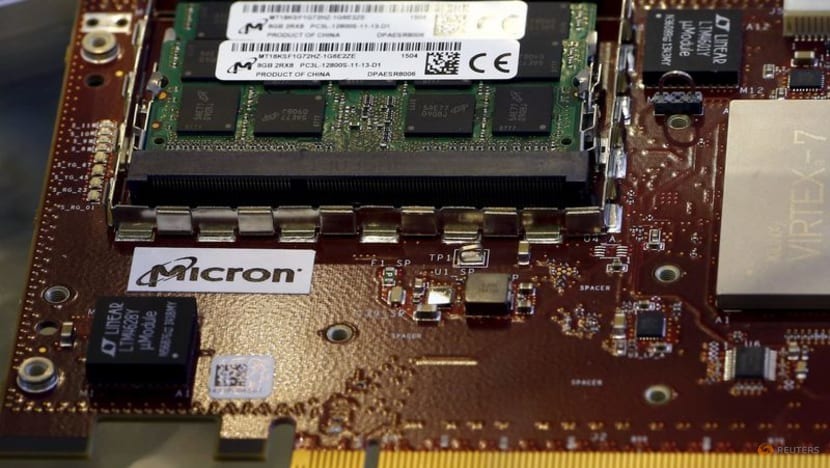China says US chipmaker Micron failed national security review, bars some purchases
22 May, 2023

US semiconductor giant Micron has failed a national security review, China's cybersecurity watchdog said on Sunday (May 21), telling operators of "critical information infrastructure" to stop buying its products.
It marked the latest escalation in the bitter chip war between the United States and China, with Washington looking to cut off Beijing's access to cutting-edge semiconductors.
Chinese authorities launched a review in March of products sold in the country by Micron, one of the world's major chip manufacturers.
"The review found that Micron's products have serious network security risks, which pose significant security risks to China's critical information infrastructure supply chain, affecting China's national security," the Cyberspace Administration of China (CAC) said in a statement.
"Operators of critical information infrastructure in China should stop purchasing Micron products."
China's broad definition of critical information infrastructure includes sectors ranging from transport to healthcare. The CAC neither provided details on what risks it had found nor what Micron products would be affected. Micron said it had received the CAC's notice of the conclusion of its review of the company's products sold in China. "We are evaluating the conclusion and assessing our next steps," it added.
When asked if the company will appeal the decision, a spokeswoman for Micron said: "We look forward to continuing to engage in discussions with Chinese authorities."
Micron makes DRAM and NAND flash memory chips and competes with South Korea's Samsung Electronics and SK Hynix as well as Japan's Kioxia, a unit of Toshiba Corp.
IMPACT ON MICRON
About 10 per cent of Micron's US$30.8 billion annual revenue last year came from China, according to company data.
But a large portion of Micron products sold in the country were bought by foreign manufacturers, analysts had said earlier, and it was not clear if the cybersecurity watchdog's decision affects sales to foreign buyers.
Jefferies analysts expected limited impact on Micron as its major customers in China are consumer electronics firms such as smartphone and computer manufacturers, not infrastructure suppliers.
"Since Micron's DRAM and NAND products are much less in servers, we believe most of its revenue in China is not generated from telcos and the government. Therefore, the ultimate impact on Micron will be quite limited," they said in a note.
The timing of the CAC's announcement was important, coming during a summit of the Group of Seven (G7) leaders in Japan, said Christopher Miller, a professor at Tufts University and author of "Chip War: The Fight For The World's Most Critical Technology."
Micron announced last week a plan to invest up to 500 billion yen (US$3.7 billion) in Japan in extreme ultraviolet technology, becoming the first chipmaker to bring the advanced chip manufacturing technology to the country that is now seeking to reinvigorate its chip sector.
US President Joe Biden on Sunday said G7 nations had agreed to "de-risk and diversify our relationship with China". The leaders also agreed to establish an initiative to counter economic "coercion".
"This case could be an early test of the G7's efforts on this front," Miller said.
"BULLYING TACTICS"
China in 2021 announced rules to protect critical information infrastructure with stricter data security requirements.
It recently also strengthened the enforcement of its data security and anti-espionage laws.
The chip war between Beijing and Washington escalated last year when the United States imposed restrictions on China's access to high-end chips, chipmaking equipment and software used to design semiconductors.
Washington also blacklisted Chinese firms, including Micron rival Yangtze Memory Technologies Co Ltd.
Washington cited national security concerns and said it wanted to prevent tech that could help develop advanced military equipment from being acquired by China's armed forces and intelligence services.
The United States imposed targeted controls on the ability of domestic industry leaders to sell their products overseas.
It has also sought to persuade key allies to follow suit.
The Netherlands and Japan - both leading manufacturers of specialised semiconductor technology equipment - have recently announced new restrictions on exporting certain products, but without naming China.
Beijing has slammed the moves as "US bullying tactics" and accused Washington of "technological terrorism", vowing that such controls will only strengthen its resolve to achieve self-reliance in the sector.
The development of a robust domestic semiconductor industry has been a longstanding goal of the Chinese government, which has invested billions of dollars in domestic chip firms.
Chips are the lifeblood of the modern global economy, powering everything from cars to smartphones, and they are forecast to become a US$1 trillion industry globally by 2030.
Nowhere is their essential nature more visible than in China, the world's second-largest economy, which relies on a steady supply of foreign chips for its huge electronics manufacturing base.
In 2021, China imported semiconductors worth US$430 billion, more than it spent on oil.
Useful Links:
Source: www.channelnewsasia.com
